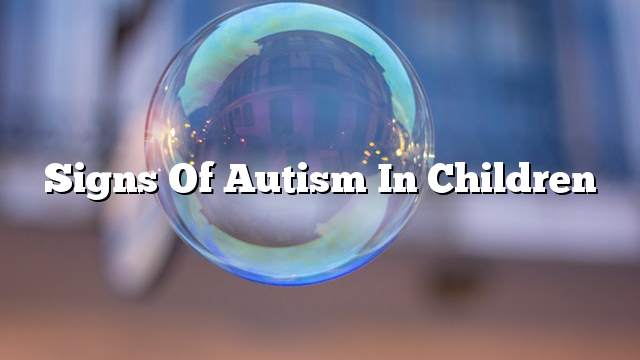Signs of autism in children
The parents start from the very first moment of their baby being watched continuously and check on the child’s health and observation. During this observation, the parents may notice that their child has autism.
Early Signs of Autism
These signs may appear on the child at the age of one year and even two years, and if it is excessive and delayed significantly, this may require recourse to the doctor:
- The child can not see the eyes directly while talking to him.
- When you smile at the child, he does not smile.
- The child does not respond to any voice or call.
- Not taking any action to attract attention.
- Do not play with others and do not ask for help in any order.
- Lack of interest in those around him and his desire to remain alone and in his own world away from what is going on around him.
- Start talking at a later age, where the child has difficulty speaking and expressing his wishes, and the tone of his voice may be different and strange.
- The expressions of joy and happiness do not appear on him.
- He does not answer when someone calls him by his name.
- No gestures, do not flag or make any signals.
Late signs of autism
Are signs that appear on the child at a later age or after two years or may be noticed by the late parents but that the treatment becomes more difficult, these may be:
- Signs of social indifference to what is happening around him, not knowing how to communicate with others, and not to want to carry or touch, and not to participate in the games of the collective, there is a defect in perception, and also notes that there is a defect in the sense of hearing.
- The signs of speech difficulties are the repetition of the sentences and the words themselves. If a question is presented in the same question instead of the answer, it uses language that is not grammatical, does not understand the simple commands that are asked or directed to it, and it is difficult to understand the joke, seriously.
- Signs of the difficulty of communication non-verbal is the difficulty of visual communication, and resort to expressions in the face do not match what he says, and the signals that are made by the cold and very incomprehensible, and has reactions that differ from everyone may be abnormal from seeing a scene or smell of smell, Finally, he may be a little motionless and move in unusual ways.
- Signs of inflexibility, which are in compliance with something and lack of flexibility in the child, insist on a particular matter where it becomes routine, and the difficulty of harmony with environmental changes, and the child’s association with strange elements do not resort to the natural child to connect with them and repeat the actions continuously and many times.
